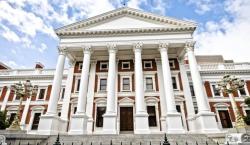
Published date
South African Parliament opened with the debate of 'no confidence' in government, which was introduced by the Leader of the political opposition, the United Party, Sir de Villiers Graaff. He said that the Government did not provide adequately for the national security of the country by failing "to take the public into its confidence, and to motivate it adequately in regard to its actions and objectives in the Angolan Civil War."
Sir De Villiers Graaff stated furthermore that if the Republic was more deeply involved than it obviously seemed, then it was surely the Government's first duty to inform the country of the essential circumstances that may have justified such a radical contradiction to the declared policies of the Republic. The Minister of Defence, P. W. Botha, reacted to the accusations of Sir De Villiers Graaff. He argued that the Republic of South Africa was situated along the most important sea route. He pointed out that South Africa is an African state and that the Republic as such cannot escape her responsibilities.
O’Malley, P. ‘1963’, from Nelson Mandela Centre of Memory and Dialog, [online], available at www.nelsonmandela.org.za (27 November 2012)|
Kalley J. A. and Schoeman E. (199) ‘Southern African Political History: A Chronology of Key Political Events from Independence to Mid 1997’, (Greenwood Press) pg 329|
South African History Online,‘Introduction’, [online], available at www.sahistory.org.za (Accessed: 27 November 2012)